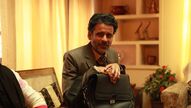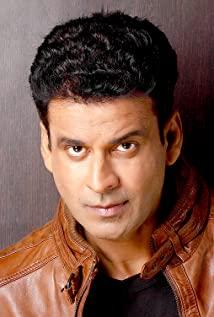"We touch, like shadows, merge into the midnight sun." The film begins with a common winter night in Uttar Pradesh, India - filled with fog, except for the passing trains, only the chirping of insects and the barking of dogs can be heard. The streets were empty. The movie's protagonist huddles on a rickshaw and returns to his quarters. They stopped outside an old three-story building, and the protagonist went up first, followed by the tricycle driver. The camera stops in the distance, and can only see a light in a room on the second floor, on, off, on, off, on, off... This shot is very long, it does not explore what happened in that room, but Shaking to the other side, two men were walking into the same building while joking about a woman's sexuality. It's hard to guess the identity of these two people, they have long sticks but no uniforms, don't know if it's the police or the militia, or someone else? Soon the lights in the room on the second floor were turned on again, and we heard fighting and shouting. The audience was then taken to Delhi to follow the investigation of Dib, a trainee reporter for the Post of India, and began to understand what was going on. I also began to gradually understand the story of the protagonist of the film. The protagonist of the film, Silas, is a linguistics professor at the Aligarh Muslim University in Aligarh, Uttar Pradesh. He is sixty-four years old, single (with a brief marriage), writes poetry in Marathi, and studies local minor languages. Folk songs, drinking a lot, sexual fluidity (this is just speculation, since the movie doesn't make a point about his sexuality). At Aligarh University where he taught (Aligarh Muslim University), his class is really unpopular - Marathi, only two or three freshmen a year. On the night at the beginning of the film, he was making out in his home with a tricycle driver, Irfan, when two men, who called themselves journalists, stormed into his home and beat them with sticks while taking videos and photos of the two in bed. The incident made headlines in the local media the next day and spread across India within a day. Silas hid at home and did not dare to go to school, where many people were passionately scolding him for his behavior, and the crowd in the camera was dressed in a religious way. The university suspended him and promptly expelled him from the university-arranged apartment. He had to start moving around and relying on people. The story of Silas actually happened when the Indian constitution briefly legalized homosexuality, and it did have a lot of repercussions in society. Therefore, this movie is also inevitable, and huge social issues are one of its protagonists. But at the same time, it also has many rare details. On the one hand because the tone of the film is like a poem, on the other hand, after all, this is a film about respecting the individual. In the context of contemporary Indian society, it's not just a professor who needs to be respected, and it's not just a "gay" victim, this movie is about everyone. The film has two main lines, one is the experience of Professor Helas, and the other is the experience of the reporter Dib. The two lines meet briefly and are more often "parallel related", that is, although they are parallel to each other, they are closely related. Deb, a journalist, a young man living in the capital, seems to be a bystander in the whole event and teaching this life. The young man with a modern education, listening to the most popular American HipHop, working in one of the most "westernized" establishments in India, he looks free. But in reality he also had to face the invasion of his privacy by the landlord, and what was worse, their invasion was unintentional. They don't know what they are doing. This violation is in contrast to that of Professor Silas. The value of Deb lies in the rebellion in his bones. In the film, his colleagues often say that he is stingy. For example, when he went to Uttar Pradesh to do research, he would choose to ride his own electric car in order to save some money. We soon understood why, he was going to give his father some money back. This is because he chose his favorite major against his father's wishes when he was in college. Most people in India have a strong sense of extended family, which is often an underlying behavioral orientation even overseas. People are too used to meddling with each other, both inside and outside the family. Therefore, in the atmosphere of traditional Indian family view, a young man still makes a choice for his own life. It was hard work, but Deb did it. The second time the two people's lives contrasted, it was Dib and his female boss drinking and making out on the rooftop, and the camera cut to the scene of Professor Silas and Irfan making out. Same-sex love and opposite-sex love are the same. In addition, I would like to talk about the role of Professor Silas, Manoj Bajpai. He was only in his forties when he acted in this film, but he had to play a sixty-four-year-old old man who was still sick. In the film, he often shrunk, as if cold and frightened, and always slow to act. When responding to others' questions, his face was weak and angry at the same time. Arguably Manoj Through the details of these limbs and applications, Bajpai allows the character's mental and physical state to be perfectly interpreted. Like the real India, the India in the film is not absolutely conservative. After being suspended from the university, Professor Hilas also received support and help from many people, so that he finally won the case - although he did not care much about it. When Professor Silas came to New Delhi from Uttar Pradesh, he found that there were so many people in New Delhi who were like him, who had their own small circles and who also loved his poetry. This kind of thing has never happened in Aligarh. According to my relatively preliminary understanding of India, most of its religious conservative forces or extreme right-wing are in North India (New Delhi is more diverse, which is an anomaly in North India), while South India is relatively open. I think it may be because of the many lower caste people in South India, some of their earlier democratic activities have laid some foundations for the opening of South India, in addition, it is South India's overseas trade that makes it more communication with the outside world, and people are more Easy access to different values. Of course, some social shocks brought about by conservative forces actually exist in the north and south. In addition, these conservative forces do not imply traditional values. Professor Hilas in the film is actually a person who maintains traditional culture (poetry, local language), but he also happens to be the target of these conservative forces. Finally, I would like to talk about some of the plots of the news media involved in the film. When the incident happened to Silas, the old fritters in the media circle did not need to investigate, but first gave a character to the incident and put a label on it. This is a common problem with journalism, and you can't blame the media people, because they have to do it efficiently, so having a pre-label of what's happening can save you a lot of trouble. But there is more than one way to improve efficiency. If you want to report something, it's best not to label it first, but to figure out what it is and what's wrong with it. Otherwise, those who create public opinion will also be dragged away by public opinion. At the end of the film, Deb is interviewing an accident in which the woman's relatives should have died, but he doesn't understand why the woman is so sad. Immediately afterwards, news of the death of a person who was very important to him came, and he felt empathy for this woman and understood what she had lost. So I tried to comfort her and comfort myself.
View more about Aligarh reviews











